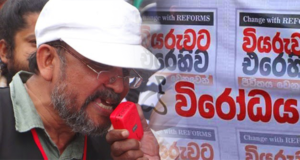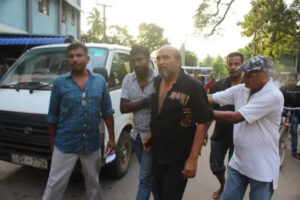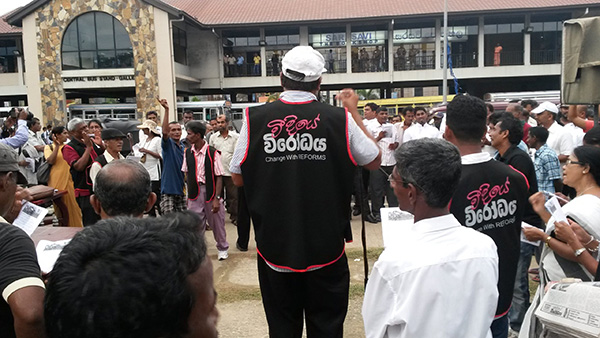
The case against a politician and his associates—an assault on peaceful protesters that lasted over a decade in the Hambantota Magistrate’s Court—finally concluded yesterday (24 September 2025), not with a criminal conviction, but with a settlement between the two parties. This drawn-out ordeal offers a stark illustration of how Sri Lanka’s judicial system punishes the victims and highlights the critical need for judicial reform.

The incident occurred on December 22, 2014, when a cultural protest titled “Veedhiye Virodhaya” (Street Protest) was planned near the Hambantota bus stand. The demonstration was a part of a countrywide movement against what was described as anti-democratic actions under the then-Rajapaksa government. The group, which included renowned vocalist Jayatilaka Bandara, journalist Sampath Samarakoon, former Hambantota Municipal Council Opposition Leader Ayub Khan, and civil society activists Philip Dissanayake and Prasanga Fernando, was assaulted by a mob led by the then-Hambantota Mayor, Eraj Raveendra Fernando.

The Unbearable Cost of Seeking Justice
For over ten years, the victims pursued justice, but the legal journey became a punishment in itself:
- Geographical and Financial Burden: The complainants, including Jayatilaka Bandara, had to travel immense distances from areas like Anuradhapura, Negombo, and Colombo just to appear in the Hambantota court as the complaining party. The costs for travel, accommodation, and time off work were unbearable.
- Lack of Local Representation: Due to the political sensitivity of the case—appearing against a powerful local politician—lawyers in the Hambantota area were unwilling to take the risk and face potential repercussions. This forced the victims to hire an extensive legal panel, including lawyers Lakshan Dias, Senaka Perera, Dulan Dassanayake, and Danushka de Silva, from Colombo, adding significantly to the already heavy legal fees.
- Systemic Roadblocks: The case was plagued by problems, including issues with police investigations, the transfer of the case between multiple judges, and endless delays in receiving advice from the Attorney General’s (AG) Department. Since the case involved charges under the Firearms Ordinance and Unlawful Assembly, the court was required to seek the AG’s advice on two separate occasions, each adding months, or even years, to the process.
- Political Shifts and Final Settlement: The defendant, Eraj Fernando, was reportedly detained for a considerable time in a separate case after his political party lost power. However, this change did little to speed up justice for the original victims. Ultimately, facing the endless delay and the unbearable costs, the victims decided to agree to a settlement.
After more than a decade—not for the culprit to be punished, but for him to formally apologise—the case was finally concluded by a settlement between the parties.
This case serves as a profound real-world example of how judicial delay in Sri Lanka effectively denies justice. It demonstrates the immense difficulties victims face in achieving accountability, underscoring the severe problems within the country’s court system. The experience highlights that when the legal process itself becomes a financial and psychological burden, even a peaceful group fighting for democracy may be forced to abandon their pursuit of a fair verdict.
